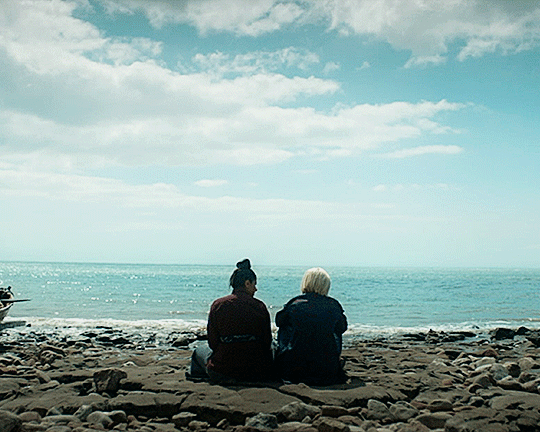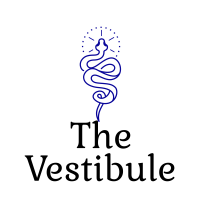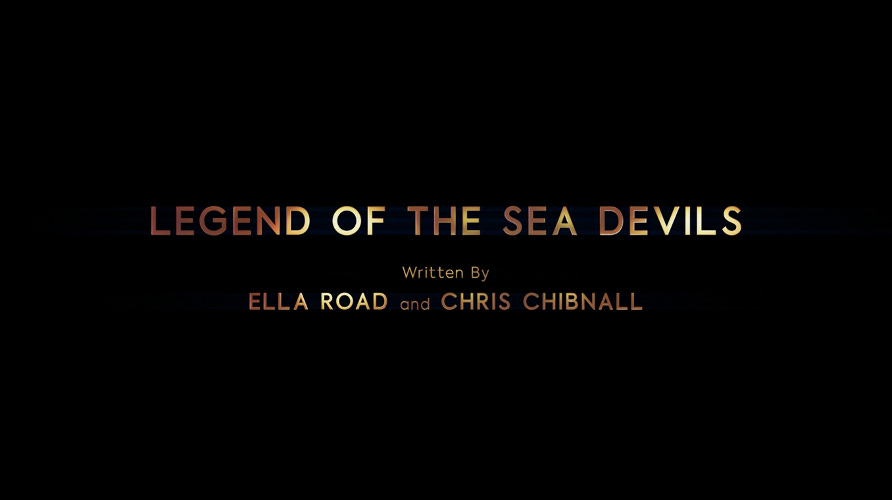
Doctor Who
“Legend of the Sea Devils”
Series 13, Episode 8 / Easter Sunday Special 2022
Written by Ella Road and Chris Chibnall
Directed by Haolu Wang
Starring Jodie Whittaker, Mandip Gill, and John Bishop
Guest Starring Marlowe Chan-Reeves, Craige Els, Arthur Lee, and Crystal Yu
47 minutes
Original broadcast 17 April 2022
1. Pasts & Presents
When Russell T. Davies decided to end his tenure as Doctor Who’s showrunner the first time, circa 2009, he followed a plan that, according to Davies’s “Great Correspondence” with Doctor Who Magazine scribe Benjamin Cook (as reprinted in their invaluable 2010 book The Writer’s Tale: The Final Chapter), Davies had settled upon as early as 2006.
In response to Cook’s 31 May 2007 question about The Sun newspaper reporting that Doctor Who “is ending after 2008,” Davies responds, via email:
The plan for 2009 and beyond? Well . . . we’ll transmit Series Four next year, then a 2008 Christmas Special, and then two-hour long Specials in 2009, most likely Easter and Christmas Day. Then a third Special in 2010 should segue into a brand new Series Five, with a new production team. We’ve planned this for ages. I remember discussing it with Julie [Gardner, executive producer] and David [Tennant, the Tenth Doctor], in Woods Restaurant in Cardiff Bay, a few days before filming began on “The Runaway Bride” [the 2006 Christmas Special shot during July and August of that year].1
As passionate Whovians know, Doctor Who’s 2008 Christmas Special (“The Next Doctor”) was indeed followed by two additional 2009 Specials, the first of which (“Planet of the Dead”) premiered on BBC One on Easter Saturday, 11 April 2009. New Who fans everywhere then bided their time for seven months until that year’s second Special (“The Waters of Mars”) premiered on 15 November 2009. “Mars” proved worth the wait, being then and now a signature Doctor Who triumph that features Tennant’s coruscating performance as the Tenth Doctor and, as he declares himself in this episode’s final moments, “the Time Lord Victorious.”
Six weeks later, the first installment of Tennant’s (and the Tenth Doctor’s) two-part swan song, the deliriously enjoyable “The End of Time: Part One,” premiered on Christmas Day 2009, followed by this story’s emotionally devastating conclusion, the tearjerking “The End of Time: Part Two,” on New Year’s Day 2010.
Davies didn’t at first anticipate Tennant’s final episode being the two-part romp that “The End of Time” became, so although he (Davies) followed the general production outline sketched by his May 2007 back-and-forth with Benjamin Cook, Davies ended up co-writing (with Phil Ford) “The Waters of Mars.” This additional Special prepared both the Tenth Doctor and New Who’s fanbase for what Davies knew would be a massive pop-cultural event: the departure of the actor whom public-opinion polls, for three years running, had named the audience’s favorite-ever Doctor (regularly outperforming Fourth Doctor Tom Baker, the reigning champion).
When Tennant, having just won the 2008 National Television Award for Outstanding Drama Performance, announced his retirement from Doctor Who during this 29 October 2008 event’s live broadcast, he sent paroxysms of surprise, shock, and grief through some quarters of New Who’s fandom. At that point, Tennant was, to my mind, second only to the fantastic Christopher Eccleston (and his redoubtable Ninth Doctor) as the franchise’s best leading man.
And while my personal rankings may seem blasphemous to other Whovians, Jodie Whittaker (the Thirteenth Doctor) and Jo Martin (the Fugitive Doctor) have joined Tennant in my number-two spot, with Peter Capaldi (the Twelfth Doctor), Matt Smith (the Eleventh Doctor), John Hurt (the War Doctor), Paul McGann (the Eighth Doctor), Sylvester McCoy (the Seventh Doctor), and Patrick Troughton (the Second Doctor) all tied for third place.
This list, of course, is bollocks insofar as I love all the Doctors, in no particular order, because every single performer has been terrific. Plus, my rankings sometimes change based on my mood or whom I’ve most recently rewatched, while my claims to despise the whole notion of ranked lists doesn’t stop them from forming in my head whenever the topic of the best Doctor arises online or in the video essays released by my favorite Doctor Who YouTubers (or, as I call them, WhoTubers).
How’s that for a wibbly-wobbly, namby-pamby refusal to commit to a singular position? I ‘yam what I ‘yam, to quote Popeye the Sailor Man, and what I ‘yam is a lifelong Whovian, meaning one member of an emotional group so attached to Doctor Who and its stars that, when these people leave to pursue other opportunities, many of us weep. Well, at least I do, finding my eyes wet every time one Doctor regenerates into her/his successor.
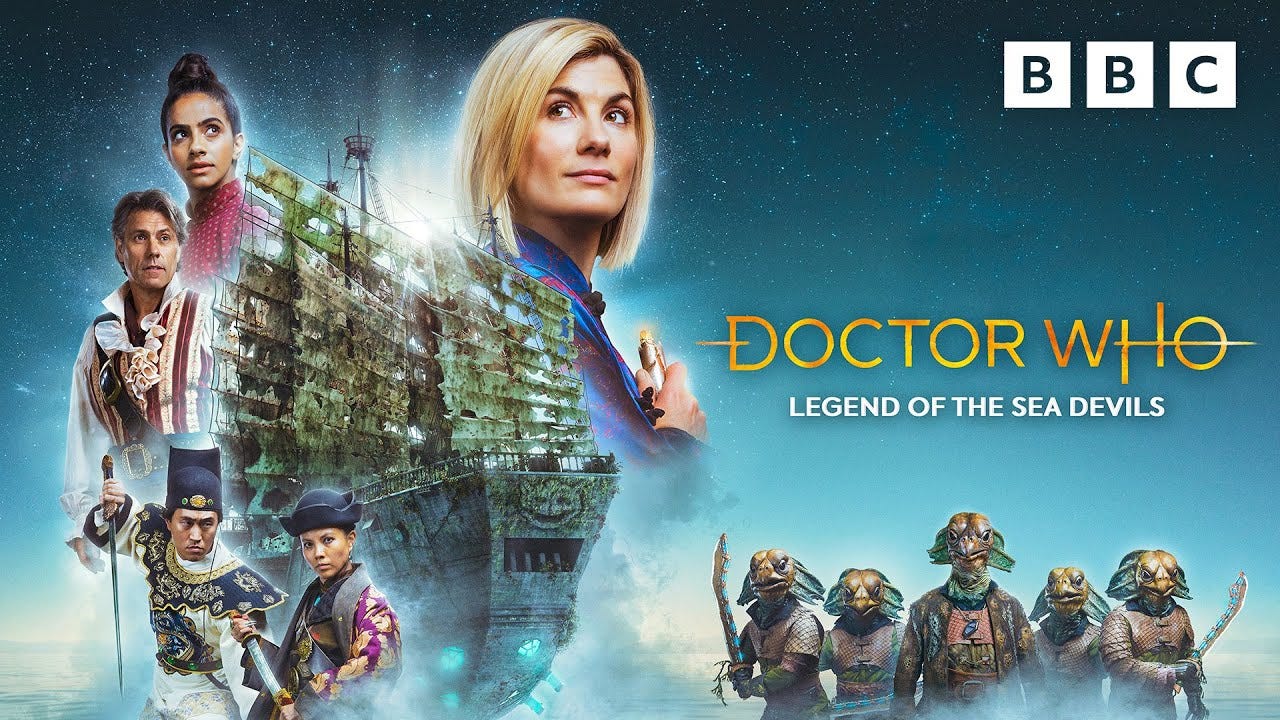
2. Devils & Details
Russell T. Davies, knowing this truth and possessing the talents of a master showman (with instincts honed by years as one of British television’s best writers and producers), milked Tennant’s and the Tenth Doctor’s departures for all they were worth, garnering gargantuan ratings, remarkable press coverage, and sustained public interest for Doctor Who, a program regarded only a few years earlier as the silly, cheap, and kitschy relic of a bygone era that had improbably become—thanks to Davies’s love, attention, and watchful showrunner’s eye—a global success, indeed the type of runaway phenomenon harder and harder to come by during an age of audience fragmentation mandated by hundreds and hundreds of channels broadcasting unprecedented amounts of visual entertainment.
In days that may seem long past, but that happened only a dozen (or so) years ago, streaming platforms were newfangled ways to access a growing digital archive of classic and current cinematic, televisual, and even stage drama. Doctor Who, however, had beaten the odds by growing more popular with each passing year, so the future looked brighter than ever when Davies and the British Broadcasting Corporation (BBC) announced that Steven Moffat—the creator of Chalk (1997), Coupling (2000-2004), and Jekyll (2007), as well as the man who’d won three consecutive Hugo Awards for Best Dramatic Presentation, Short Form for his contributions to New Who’s Series 1 (“The Empty Child” / “The Doctor Dances”), Series 2 (“The Girl in the Fireplace”), and Series 3 (“Blink”)—would assume showrunner duties from Davies for Series 5.2
Davies explains the rationale behind broadcasting intermittent special episodes throughout 2009 (rather than producing a full series of 13 installments plus a Christmas Special) in terms both creative and practical: “The show, by 2009, will simply need a rest. We need to starve people a bit. We’re producing 14 movie-sized episodes a year, which are then repeated ad infinitum, and ratings are bound to decline, even just a little. Doctor Who is a phenomenon right now, but nothing stays a phenomenon. Not without careful management.”3 Everything Davies says here has come to pass, with Moffat’s tenure taking Doctor Who to new heights of global popularity during the Eleventh Doctor’s three seasons before ratings started declining once Capaldi’s Twelfth Doctor boarded the TARDIS.
The Thirteenth Doctor’s era has seen ratings dip even further, but unlike other observers, I don’t blame this inevitable descent on the program’s quality since, despite my disagreements with Moffat’s portrayal of women during most of his run and New Who’s disappointingly tin-eared approach to race and ethnicity during much of its span, I’ve still enjoyed the range, scope, and diversity of stories that Doctor Who’s told during the Moffat and Chibnall eras.
My reviews of Chibnall’s three seasons as showrunner (Series 11, Series 12, and Series 13) are a matter of record, so anyone who’s kept up (or catches up) with them knows that I admire Chibnall’s captaining of the Who ship far more than some commentators do. Even so, neither Moffat when he left nor Chibnall now that he’s handing the showrunner reins back to Davies (who’s already deep into planning the franchise’s 60th Anniversary Special and seasons beyond) managed to generate quite as much excitement for their era’s final adventures as Davies did.
Again, I don’t blame Moffat or Chibnall for not equalling Davies’s achievement since each man produced his version of Doctor Who amidst an unprecedented amount of rival programming for each viewer’s attention. So much television made in the English language, to say nothing of every other language, is available for easy streaming that no person could watch even five percent of it if he/she/they dedicated every waking moment to doing so.
We are left with an embarrassment of televisual riches among the many mediocre and bad shows out there, meaning that all hopes of keeping pace with the medium are now as fruitless as trying to read every novel published in English since those days in the 18th Century when novels in English were first circulated (and it goes without saying that all the novels translated into English from other languages make this pile unconquerable). The impossibility of this task paradoxically frees us to watch what we like and to like what we watch as we see fit, when we see fit, with whom we see fit, and with whatever standards fit us best.
People like myself—your humble commentator, critic, guide, observer, reviewer, roustabout, or whatever title you wish to assign me—pronounce our judgments about a particular franchise’s, program’s, or episode’s quality based purely on how we see matters during those days when we prepare our comments for your enjoyment, judgments that can (and sometimes do) change with time, but that I hope we offer with intelligence, wit, and humility.
So has it ever been, but this long preamble to my review of Doctor Who’s 2022 Easter Day Special (the winningly titled “Legend of the Sea Devils”) is my attempt to provide context for its place within New Who’s tradition of the current showrunner offering his (for now his, but one day soon, I trust, hers and their) penultimate effort before his final voyage as chief writer forever etches itself in our collective memory. Let’s be happy that New Who has lasted long enough for this tradition to exist at all, which is a remarkable testament to the franchise’s durability, popularity, and quality.
Chris Chibnall’s kept these creative flames burning, mostly brightly, for five years, but I’m sorry to report, dear reader, that his second-to-last contribution to onscreen Who dims just enough to make “Legend of the Sea Devils” a disappointment that still provides, here and there, worthwhile entertainment.
Russell T. Davies, by contrast, gifted us the incredible “The Waters of Mars” and Steven Moffat gave us the excellent “The Doctor Falls,” which, while not the masterpiece that his Series 9 installment “Heaven Sent” is, remains a high point of Moffat’s time as showrunner despite his objectionable decision to dispatch and revive Pearl Mackie’s marvelous Bill Potts, New Who’s first openly queer companion, in a famous example of the “Bury Your Gays” trope that’s been justifiably rebuked since the 1 July 2017 broadcast of Series 10’s finale.
Although “Legend of the Sea Devils” succeeds best when acknowledging the romantic feelings that’ve developed between Jodie Whittaker’s Thirteenth Doctor and Mandip Gill’s Yasmin “Yaz” Khan, her longest-running companion and one of the best Who characters ever to grace the screen, Chinball’s script, assisted by franchise newcomer Ella Road, doesn’t match the depth or quality of either predecessor.
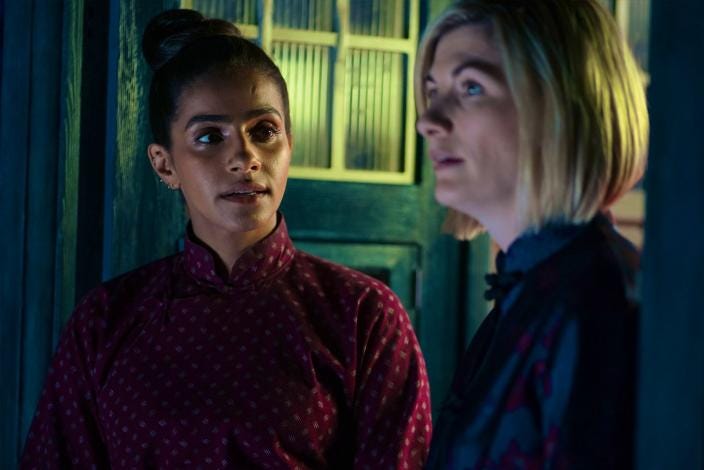
Indeed, the lovely character moments seen in “Legend of the Sea Devils” come mostly toward the end of its frenetic, muddled, and intermittently fun sprint through 16th- and 19th-Century China’s pirate seas. This episode throws so many narrative developments at us that “Legend of the Sea Devils” comes to resemble those choose-your-own-adventure books so popular during the 1970s and 1980s, meaning that you take from this installment whatever you wish in whatever manner you wish it.
Or, at least, that’s how “Legend of the Sea Devils” feels while watching it, making this outing among the pulpiest episodes Chibnall’s ever authored (and, lest we forget, Chibnall’s the man who wrote both Series 11’s “Arachnids in the UK” and Series 12’s two-part “Spyfall” premiere). The pace is punishing, the Sea Devils are wonderfully designed and performed yet bland, and the whole story threatens to fly apart at the seams, this last quality being a winning New Who tradition that “Legend of the Sea Devils” cannot quite uphold, try as it might.
This assessment doesn’t mean that “Legend of the Sea Devils” is joyless, meritless, or a slog to endure, but it also doesn’t live up to its billing as a swashbuckling adventure that will leave viewers breathless. And as its showrunner’s next-to-final effort, “Legend of the Sea Devils” shall forever remain a curio that, unlike “The Waters of Mars” or “The Doctor Falls,” makes few preparations for its writer’s last crack at New Who’s narrative bat.
Let’s not get too gloomy or morose, since this trip through the time vortex is awash in color, exuberance, and excellent performances by both principal and guest actors. Yes, friends, I enjoyed “Legend of the Sea Devils” enough to watch it twice more after initial broadcast, but repeat viewings, unlike most Chibnall-era installments, reveal few additional layers or themes lying beneath the surface that patrol the narrative depths like the sea monster that leaps into view to frighten this entry’s characters.
Please forgive this terrible pun, but if the devil resides in the details, then “Legend of the Sea Devils” isn’t up to scratch (get it?) because its particulars can’t fulfill Chibnall’s desire to spin a grand pirate yarn that, in the end, seamlessly fuses folly, solemnity, and emotional maturity into an hour of powerful drama. This episode, instead, must settle for maintaining our interest for 47 minutes, but little more.
If achieving this goal counts as success, then Chibnall should declare victory and never look back. The rest of us, however, aren’t so lucky even if this episode, more anticlimax than failure, now puts tremendous pressure on Chibnall to deliver a final TARDIS trip, namely the feature-length and as-yet-untitled BBC Centenary Special set to premiere sometime in Autumn 2022, that must offer a poignant and rousing salute to the Thirteenth Doctor’s groundbreaking era.

3. Pirates & Placeholders
“Legend of the Sea Devils,” put another way, is better than middling, but far from great. Certain aspects are undoubtedly terrific, including the cast’s performances, Ray Holman’s beautiful costumes, Segun Akinola’s lovely score, and the makeup and prosthetic teams’ nicely updated design of the Sea Devils, who stalk both an 1807 Chinese village and not one, but two Chinese pirate ships with palpable danger that putters out halfway through this outing. Perhaps Chinball’s best single idea is resurrecting these Classic Who antagonists, previously seen in three serials: their introduction in Season 9’s Third Doctor story The Sea Devils (1972), a brief cameo in Season 10’s Third Doctor story Frontier in Space (1973), and starring alongside the Silurians in Season 21’s Fifth Doctor story Warriors of the Deep (1984).
Although the Sea Devils make blink-and-you’ll-miss-them New Who appearances in the Series 5 premiere, 2010’s “The Eleventh Hour” (notably, the first full adventure for Matt Smith’s Eleventh Doctor) and the Series 12 finale, 2020’s “The Timeless Children” (notably, the Thirteenth Doctor’s most recent battle with Sacha Dhawan’s Spy Master), their resurrection in “Legend of the Sea Devils” comes 38 years after the last Who episodes devoted to them (and 50 years after their inaugural appearance), so I commend Chibnall for returning one of the classic series’s most intriguing terrestrial species to our television screens.
Steven Moffat introduced the lizard-like Silurians into New Who during Series 5’s fine two-parter “The Hungry Earth” / “Cold Blood” before including additional Silurian characters, particularly Neve McIntosh’s delightful Madam Vastra, in later Eleventh and Twelfth Doctor installments, but Moffat never addressed the Sea Devils, an aquatic species genetically related to the Silurians that, like their land-based cousins, evolved on Earth long before humanity. Whittaker’s Thirteenth Doctor breezily summarizes this history for Yaz during “Legend of the Sea Devils,” while the machinations of the Chief Sea Devil (Craige Els)—who receives no other name—to destabilize Earth’s magnetic field, reverse the position of Earth’s poles, melt the ice caps, and flood all land masses to reclaim the planet for his people makes sense (no, seriously!) given the Silurians attempt to massacre humanity in Series 5.
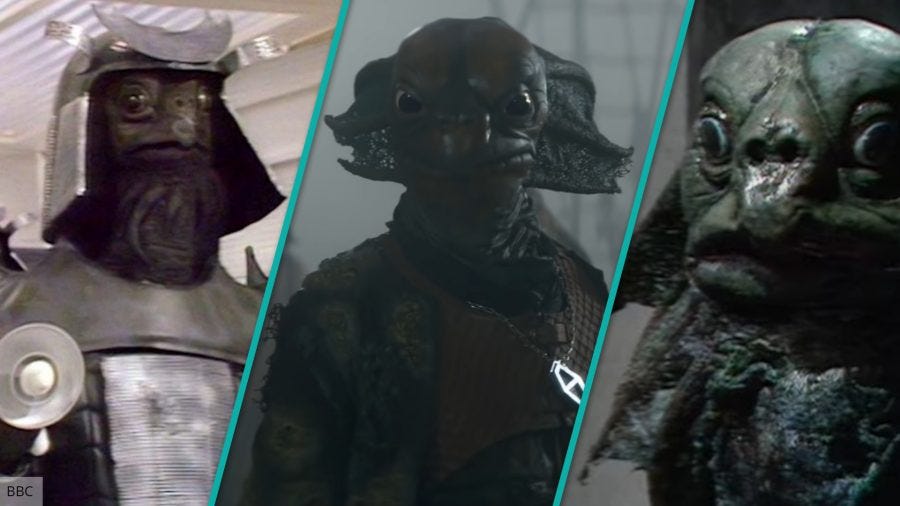
Indeed, the Silurians’ initial wishes in “The Hungry Earth” and “Cold Blood”—to reclaim the planet from human beings, whom the Silurians consider apelike interlopers—are as genocidal as the Chief’s in “Legend of the Sea Devils,” although the Eleventh Doctor tries to forge a treaty between the Silurians and humanity so that both species may share the planet. The Thirteenth Doctor, however, doesn’t attempt a similar pact in “Legend of the Sea Devils,” mostly because the Chief Sea Devil, as the Doctor soon realizes, is a fanatic whose plans demand an immediate response. Even so, the Doctor not trying to convince the Chief to share Earth with humanity seems a strange oversight for Chibnall to make considering his high regard for Davies’s and Moffat’s work, as seen in several Series 11, 12, and 13 installments.
How long, after all, would it take the Doctor to propose a conclave between the Chief Sea Devil and Crystal Yu’s “pirate queen” Madam Ching? Even if one or both reject this notion out of hand, the Doctor suggesting such talks seems wise, particularly given how Whittaker’s Thirteenth Doctor has carried forward New Who’s tradition of its protagonist offering adversaries, no matter how fearsome or psychotic, the opportunity to redeem themselves by pursuing peace rather than violence.
Chibnall and co-writer Ella Road rush “Legend of the Sea Devils” from scene to scene and crisis to crisis with nary a moment to spare, a tempo that director Haolu Wang (another franchise newcomer) embraces in action sequences that move, move, move! Exciting as these scenes are, their easily fixable flaws (the Doctor forgetting to keep the peace foremost among them) paradoxically bogs them down and makes them less than the sum of their parts.
The Chief Sea Devil’s dastardly plan, however, replays beats, moments, and themes from two of Chibnall’s great pop-cultural enthusiasms, so evident throughout his time as New Who’s showrunner: the James Bond film franchise and disaster movies of all types. Flooding the world is not merely Karl Stromberg’s (Curd Jürgens’s) megalomaniacal scheme in 1977’s Bond classic The Spy Who Loved Me but also the founding basis of Kevin Reynolds’s unliked-yet-underrated 1995 disaster epic Waterworld. We could extend these comparisons to many other examples, including Star Trek: Deep Space Nine’s Season 4 Bondian homage “Our Man Bashir” and J.G. Ballard’s excellent 1962 novel The Drowned World, but the point is that Chibnall adopts a well-worn premise for “Legend of the Sea Devils” that he refracts through Doctor Who’s absurdist prism with only moderate success.
“Legend,” as such, wants to give everybody who watches a nostalgic gift of some kind, but can’t quite fulfill this mission. Don’t misunderstand these observations as outright dismissals of the episode’s quality. Its production is certainly handsome, its acting is typically stellar, its costumes are unsurprisingly attractive, and its visual effects are occasionally fabulous, although the sight of the Chief Sea Devil leaping aboard a pirate ship hovering in the air (yes, really!) is so unconvincing—yet hilarious—that it’s either an affectionate nod to the rough visual effects of Chibnall’s beloved, low-budget pulp movies or an outright error of the type that results from the effects team running out of time (which is tough to believe given the nearly four-month gap between this installment and its predecessor, New Year’s Day’s “Eve of the Daleks”). Charitable fans like myself find such deficiencies charming whenever they crop up in New Who or Classic Who, so, again, I’m not complaining too much.
Even so, “Legend of the Sea Devils” could have been—and should have been—better given its place as the Thirteenth Doctor’s penultimate adventure. This deficiency rankles more than any other, which leaves “Legend of the Sea Devils” as a finally unsatisfying New Who adventure no matter its other achievements.
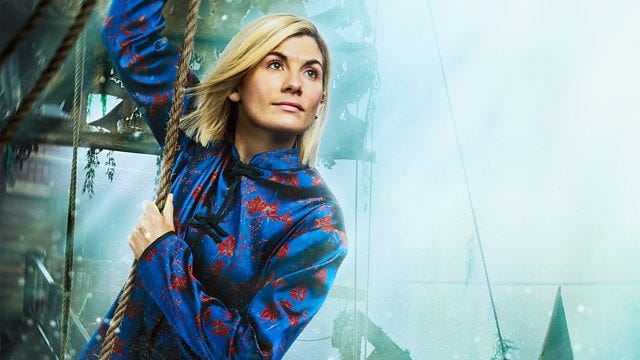
Let’s also ponder how poorly this outing would’ve been received were it the Thirteenth Doctor’s final trip in the TARDIS. Some 2021 news articles, after all, while reporting that Jodie Whittaker and Chris Chibnall were leaving Doctor Who after three seasons, mention that Series 13 (subtitled Flux) was initially planned as 11 episodes, but then reduced to eight installments (six Flux entries plus two Specials broadcast on New Year’s Day and Easter Sunday) due to pandemic-related production difficulties.4 This alteration surely explains why Flux, good as it is, feels rushed and unfinished in spots, since Chibnall was forced to condense its serialized story into a shorter run by eliminating entire scenes, sequences, and subplots.
These same articles reveal that the first two Specials were filmed alongside Series 13, but that the BBC commissioned another, two-hour Special to celebrate the network’s centennial and to send the Thirteenth Doctor off in style.5 If true, Chibnall’s plan would apparently have ended Thirteen’s run with “Legend of the Sea Devils” despite this episode making no effort to tie up Flux’s loose ends or the Timeless Child mythology that, introduced in Series 11’s second episode (“The Ghost Monument”), was crucial to Flux’s narrative. While the Doctor fighting to save humanity from the Chief Sea Devil’s drown-the-planet scheme might, in another context, be a fitting end to her heroic adventures, the dissatisfying aspects of “Legend of the Sea Devils” would’ve made it the least-memorable exit for any New Who Doctor.
If so, I wonder if the well-choreographed fight scene between the Chief Sea Devil and Thirteen toward this episode’s conclusion, where we see the Doctor lean far enough backward to escape (by millimeters) the Chief’s sword strike, originally landed a fatal blow that triggered the Thirteenth Doctor’s regeneration. If so, what an underwhelming way to go out, meaning that Chibnall either intended “Legend of the Sea Devils” to be his final episode as showrunner or his initial story was delayed to the Centenary Special. Or, perhaps, Chibnall simply ran out of time and energy so that, when BBC executives read Chibnall’s early drafts of “Legend of the Sea Devils,” they were forced to greenlight another installment, with a separate budget and filming block, to ensure that the first female Doctor regenerated under better circumstances.
Since we may never know the true behind-the-scenes reasons for Chibnall’s and Whittaker’s exits, my speculation here merely notes that “Legend of the Sea Devils” would be a particularly poor final adventure for any Doctor, much less the vivacious Thirteenth Doctor. “Legend” looks for all the world like an episode developed from a bare-bones premise (“In this historical adventure, the Doctor meets Chinese pirates. Oh, and she fights the Sea Devils!”) tossed off by someone brainstorming ideas during a writers’-room conference that, while not strong enough to become a full-fledged story, was one of those notions held in reserve in case more promising scripts fell through and the production team was forced at the last minute to plug the resulting hole in their schedule with a substitute installment.
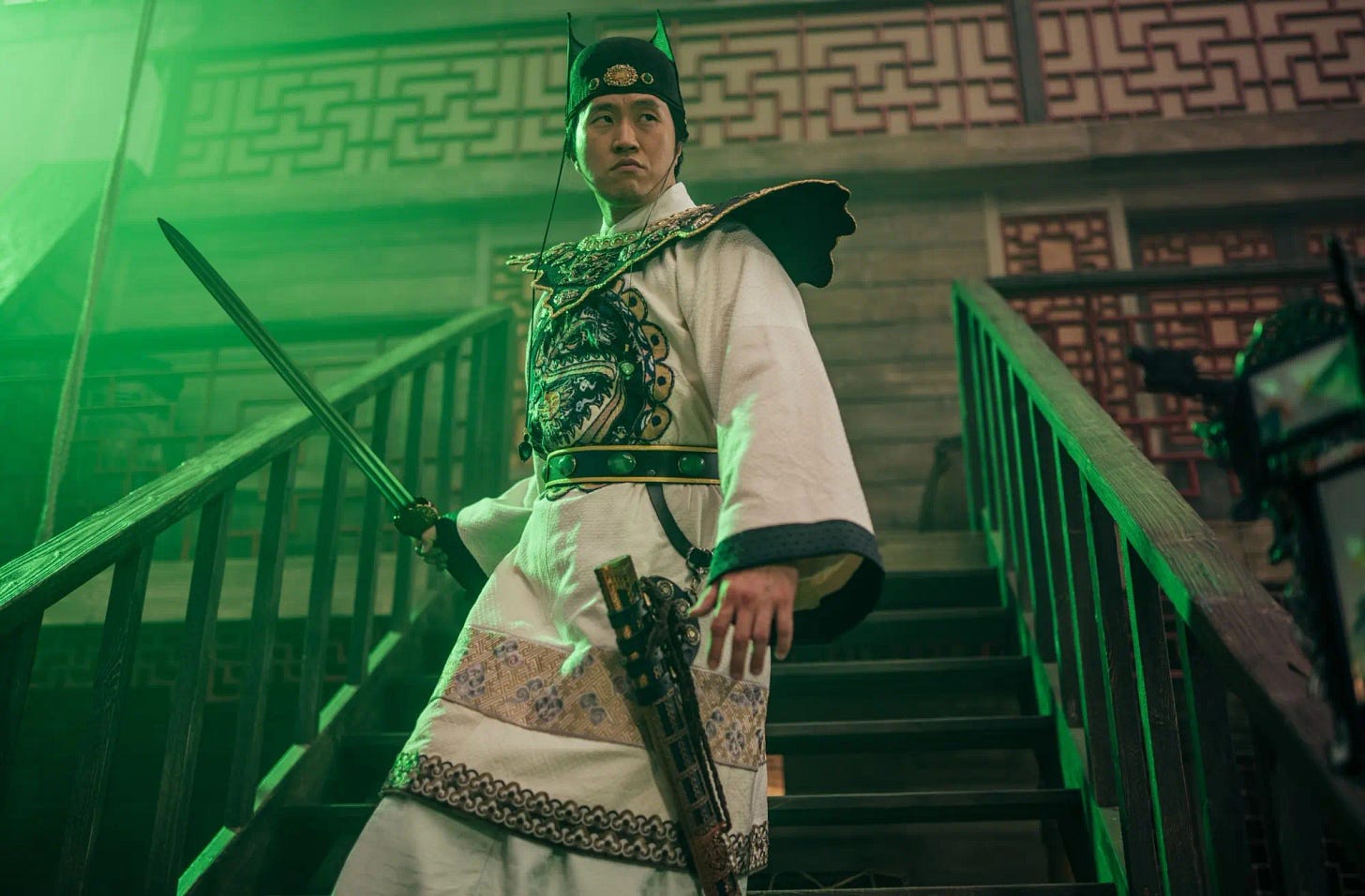
“Legend of the Sea Devils,” in other words, is a perfectly fine, middle-of-the road, just-better-than-mediocre entry that, in any other context, would receive a short review praising its cast and spotlighting its half-successful attempt to dramatize the life of Madam Ching (known as both Ching Shih and Zheng Yi Sao—“wife of Zheng Yi”—after her 1801 marriage to the powerful and famous Guangdong pirate Zheng Yi). Crystal Yu, best known to British audiences for playing Lily Chao in five seasons of the BBC’s long-running hospital drama Casualty (1986-Present), brings Madam Ching to magnificent life, but, just like the fictional pirate Sin Ji-Hun and the fictional villager Ying Ki (finely and respectively played by Arthur Lee and Marlowe Chan-Reeves), Yu the performer gives more to the role than exists on the page.
We get little sense of Madam Ching’s importance, both to the history of China and the history of piracy, beyond her status as a fierce warrior who releases the Chief Sea Devil from his imprisonment inside a stone statue towering over Ying Ki’s coastal Chinese village in the year 1807. She takes this dangerous action hoping to find clues to the treasure of the fabled, sunken Portuguese sailing ship Flor de la Mar and thereby afford the ransom placed on her entire crew—including her two young sons—by rival pirate Guo Podai and his Black Flag Fleet (both of which existed in real life, but remain unseen here).
Considering how well the production-design, costume-design, and set-dressing teams bring Ying Ki’s village, Madam Ching’s 19th-Century pirate ship, and Ji-Hun’s 16th-Century pirate vessel to life, the script’s relative inattention to its three guest characters is disappointing, to say the least. If, however, this episode urges viewers to research Chinese piracy’s fascinating history, then Chibnall and co-writer Ella Road deserve credit for spotlighting a powerful female figure from the past who should be better known.
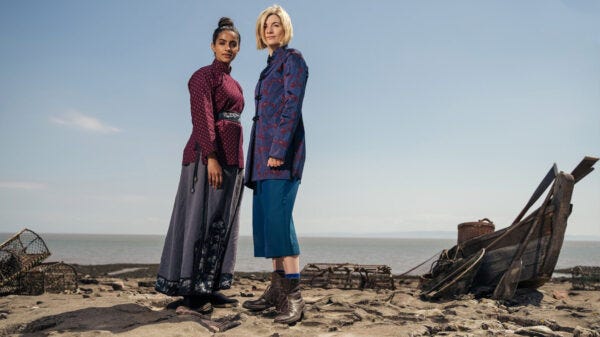
4. Doctors & Dates
Credit may be due, yet praise is not. “Legend of the Sea Devils” is certainly no worse than the other Doctor Who pirate adventures we’ve seen over the decades, but also no better than, say, Series 6’s unjustifiably derided Eleventh Doctor romp “The Curse of the Black Spot” (2011); the Fifth Doctor serials Terminus and Enlightenment (both 1983); the Fourth Doctor serial The Pirate Planet (1978); the only existing, second installment of the Second Doctor serial The Space Pirates (1969); and what we know of the lost, First Doctor serial The Smugglers (1966). No, the best I can say about “Legend of the Sea Devils” is that, by pairing John Bishop’s wonderfully engaging companion Dan Lewis with Ying Ki for whole stretches of this episode’s action, Chibnall gives us—finally and at long last—as close to a solo adventure for the Thirteenth Doctor and Yaz as we’ll ever see.
Readers of my Flux reviews know that I think Chibnall should have addressed Thirteen and Yaz’s burgeoning romantic feelings throughout Series 13 while they travelled the cosmos together enjoying the fun scrapes, dangerous situations, and emotional complications that the Doctor’s best adventures always contain. That Chibnall didn’t is a lost opportunity of the first order.
Despite still rating Flux highly within the pantheon of New Who’s best stories, I contend that devoting more narrative real estate to conversations between Thirteen and Yaz like we get in “Legend of the Sea Devils” would have improved Series 13. Indeed, the best two scenes in “Legend of the Sea Devils” find the Doctor, in her chirpy way, explaining that she can’t attach herself to anyone too much because the inevitability of their parting forces her to keep moving rather than rooting herself in one place for too long.
The subtext of the Doctor’s dialogue is that her fear of losing the people she deeply loves comes from living so long. Every incarnation she’s experienced has seen companions come to tragic ends, so the Doctor forestalls even greater pain by not getting romantically involved with her friends.
Yet it’s lovely to hear the Doctor tell Yaz, “Dates are not something I really do, you know. I mean, I used to. Have done. And if I was going to, believe me, it’d be with you. You’re one of the greatest people I’ve ever known, including my wife.” Jodie Whittaker and Mandip Gill are wonderfully restrained yet beautifully expressive here, with Chibnall’s dialogue acknowledging the whole history of the Doctor’s complicated relationships with Billie Piper’s Rose Tyler, Freema Agyeman’s Martha Jones, Karen Gillan’s Amy Pond, Jenna Coleman’s Clara Oswald, and even Alex Kingston’s fabulous River Song (the Eleventh and Twelfth Doctor’s wife, for anyone who’s forgotten) without explicitly invoking their names or their histories.
That’s good writing on Chibnall’s part, as is the final scene of “Legend of the Sea Devils,” where Thirteen and Yaz sit on the beach near Ying Ki’s village and skip stones across the water’s surface. “My nani says courage is knowing something will hurt and doing it anyway,” Yaz tells the Doctor before undercutting this adage with humor: “Mind you, she also said it’s the definition of stupidity.” The Doctor, in a sentence pregnant with meaning for a character only one voyage away from regenerating, replies, “Can we just live in the present? Of what we have, while we still have it?” before ending “Legend of the Sea Devils” with these famous last words: “I wish . . . I wish this would go on forever.”
So do I, just as I wish this entire Easter Special were as poignant and deeply felt as these interactions between the Doctor and Yaz. Such scenes demonstrate how good “Legend of the Sea Devils” might’ve been, but also how, in the end, it’s a dissatisfying prelude to the Thirteenth Doctor’s final journey. When “Legend of the Sea Devils” flies high, particularly when the Doctor and Yaz enjoy their time together, it’s as good as anything seen since Doctor Who returned to television in 2005. Yet these moments are so few and so far between that this 2022 Easter Special isn’t special enough to merit its place as the Chibnall era’s penultimate trip through time and space.
I wish I could say otherwise, but fear not, dear reader, for I shall maintain my faith in Chibnall’s and his talented collaborators’ ability to dazzle us with a memorable, multifaceted, and moving Centenary Special that will give the Thirteenth Doctor and Jodie Whittaker the farewell they deserve. That’s a saturnine note on which to conclude this review of “Legend of the Sea Devils,” but the news isn’t all bad. My Doctor Who hopes, after all, have always—and shall always—spring eternal.
NOTES
Russell T. Davies and Benjamin Cook, The Writer’s Tale: The Final Chapter, BBC Books, 2010, p. 132.
Cook asks his question about The Sun newspaper report in an email message to Davies bearing the subject line “Re: Charlie Hunnam’s Arse” and date-and-time-stamped 31 May 2007 12:31:56 GMT. Davies’s reply, bearing the same subject line, is date-and-time-stamped 31 May 2007 18:42:10 GMT.
“Doctor Who Guru Davies Steps Down,” BBC News, 20 May 2008, http://news.bbc.co.uk/2/hi/entertainment/7411177.stm.
Davies’s thoughts about starving the audience come in the same 31 May 2007 message mentioned above.
Patrick McLennan, “Doctor Who Showrunner Chris Chibnall Confirms Season 13 Will Be Three Episodes Shorter than Usual,” Radio Times, 11 November 2020, https://www.radiotimes.com/tv/sci-fi/doctor-who-chris-chibnall-cuts-news/.
Andrea Laford, “Jodie Whittaker and Chris Chibnall to Leave Doctor Who after Trio of 2022 Specials,” Cultbox, 29 July 2021, https://cultbox.co.uk/news/headlines/jodie-whittaker-and-chris-chibnall-to-leave-doctor-who-after-trio-of-2022-specials.




